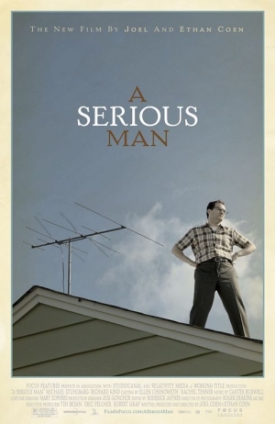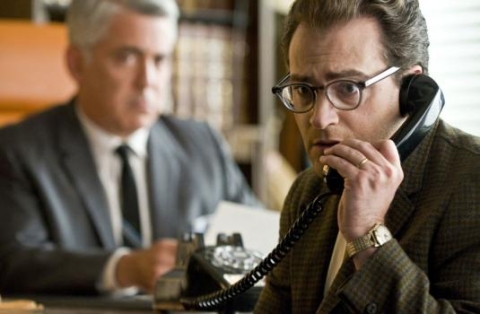A Serious Man is a personal and exquisitely crafted black comedy that explores the pointless nature of suffering in 1960s Minnesota.
One of the handy things about winning a clutch of Oscars is the collateral it gives you to make a personal and defiantly anti-Hollywood film with no name stars.
After the critical, commercial and Oscar success of No Country for Old Men, this is precisely what Joel and Ethan Coen have done with their latest project.
Beginning with a bizarre extended prologue set in an Eastern European shtetl, it moves on to explore the hellish suburban existence of a Jewish maths professor named Larry Gopnik (Michael Stuhlbarg) in Minnesota, during 1967.
With a hectoring wife (Sari Lennick) who wants a divorce, her annoying widower lover (Fred Melamed), a leeching brother (Richard Kind), a pothead son (Aaron Wolff ) into Jefferson Airplane, dithering academic colleagues, an awkward Korean student and a succession of perpetually useless rabbis, he appears to living in a modern day version of The Book of Job.
All of this is filmed with a precision and defiant, dark wit that is a hallmark of the Coens at their very best.
If you enjoyed the pointless, bumbling criminality in Fargo and the satire of Bush-era stupidity in Burn After Reading then you will probably love this. If not, then you probably won’t.
But even those put off by the tone of the film would be hard pressed not to admire the sheer class on display behind and in front of the camera.
 The performances are mostly note perfect, with Stuhlbarg especially outstanding in the lead role and a supporting cast filled with fine contributions, although keep a special eye out for George Wyner and Simon Helberg as two contrasting rabbis.
The performances are mostly note perfect, with Stuhlbarg especially outstanding in the lead role and a supporting cast filled with fine contributions, although keep a special eye out for George Wyner and Simon Helberg as two contrasting rabbis.
On a technical level, it is up to the very highest standards of modern cinema.
Regular collaborator Roger Deakins shoots with his customary artful precision whilst the production design, art direction and costumes are flawless.
Watching it on a beautiful digital projection, I was already thinking how great this is going to look on Blu-ray.
As usual the editing (by the Coens under their regular pseudonym Roderick Jaynes) is splendid and listen out for how they way they’ve mixed the sound, be it Jefferson Airplane on a portable radio or the way a family slurp their soup.
Part of the richness of the film lies in its uncompromising take on suburban angst. There is no let up, no cheesy uplift and the characters are mostly a succession of grotesques there to torment the protagonist. But really, it is funny.
For some this will merely be a pointless exercise in misanthropy but there is something deeper here that the Coens are targeting, namely the false comforts and rules in which many place their trust.
Religion, family, career advancement, philosophy and consumerism are all subjects which get thoroughly skewered over the course of the story. The comedy that comes out of this, is one rooted in recognition and pain rather than goofy, slapstick relief. The laughs here are muffled but highly acute.
In the hands of lesser filmmakers this could easily be a mess, but with the Coens it feels just right. In fact it feels so authentic that one can only presume that much of it is rooted in their personal experience of growing up in St. Louis Park, Minnesota.
Back in 1998 I remember reading an interview where they talked about signing up for a record club as teenagers and anyone who watches the film with this in mind will feel a twinge of recognition at one of the sub-plots.
Bob Graf, the Coens’ longtime producer said to the Star Tribune last year that:
“It’s a story inspired by where they grew up, things that they remembered from their childhood”
Whilst assistant art director Jeff Schein has also commented on the time period:
“It’s a mental travelogue of 1967, and for me, since I grew up near the Coens in St. Louis Park, it’s a childhood story.”
Aside from the autobiographical aspects, it will be interesting to see how Jewish audiences react to the film, with its richly detailed observations about Jewish life.
Not only do we have an startling prologue spoken entirely in Yiddish, but there are sequences involving a large gallery of Jewish characters: waddling secretaries, puzzled dentists, shouting wives and cryptic rabbis are all going to evoke twinges of recognition, laughter and – amongst some – disquiet.
But although it is drenched in Jewish culture – specifically that of the Midwest – it isn’t exclusively about Jews or Jewishness.
Ultimately one could put forward a compelling case for saying that the film is about throwing the enigma of religious teaching back on itself. This is effectively a non-parable made up of parables, that highlights how the ‘answers’ of Judaism (and organised religion) merely lead to more confusion and chaos.
My guess is that this will not be the awards slam dunk that Fargo or No Country For Old Men turned out to be and some will be put off by the slow pace and darkly poetic humour.
But this is the Coen Brothers operating at their very best, a heartfelt and beautifully constructed piece of cinema that is likely to reward future viewings.
A Serious Man is out at UK cinemas on Friday 20th November
